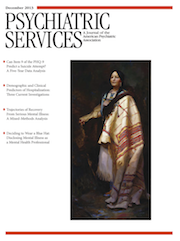Antipsychotic Formulation and One-Year Rehospitalization of Schizophrenia Patients: A Population-Based Cohort Study
Abstract
Objective
The authors compared the efficacy of long-acting injectable antipsychotics and oral antipsychotics on rehospitalization rate of community-dwelling patients with schizophrenia who had frequent admissions.
Methods
The cohort study of 14,610 patients was conducted by analyzing the Taiwan National Health Research Institutes data. The patients were divided into groups that received oral antipsychotics (risperidone, a different second-generation antipsychotic, or a first-generation antipsychotic) or long-acting injectable antipsychotics (risperidone, haloperidol, or flupenthixol).
Results
One-year rehospitalization rates of the final cohort of 10,552 patients were the same for both groups (by long-acting injection, 27.3%; by oral administration, 27.3%). Secondary analysis of groups receiving long-acting injectable medication showed that haloperidol resulted in lower rehospitalization rates (haloperidol, 22.5%; risperidone, 27.1%; and flupenthixol, 29.5%). Patients’ characteristics, including age, region, and insurance payments were significantly correlated with the risk of relapse (p<.05).
Conclusions
Except for injectable haloperidol, long-acting injectable antipsychotics seem not to be superior to oral antipsychotics in reducing rehospitalization.



